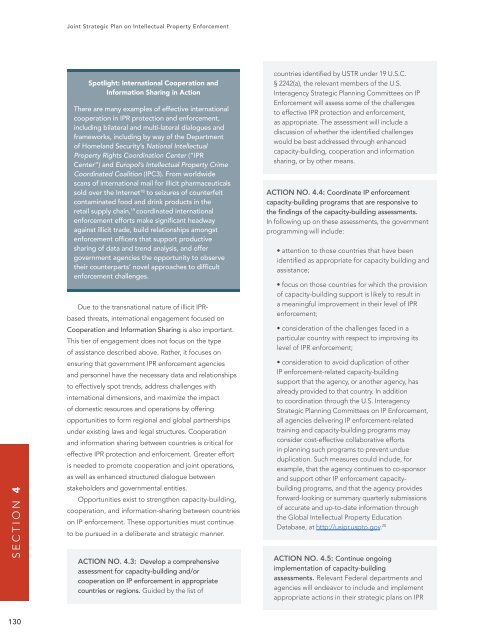ENFORCEMENT
eop_ipec_jointstrategicplan_hi-res
eop_ipec_jointstrategicplan_hi-res
Create successful ePaper yourself
Turn your PDF publications into a flip-book with our unique Google optimized e-Paper software.
Joint Strategic Plan on Intellectual Property Enforcement<br />
SECTION 4<br />
Spotlight: International Cooperation and<br />
Information Sharing in Action<br />
There are many examples of effective international<br />
cooperation in IPR protection and enforcement,<br />
including bilateral and multi-lateral dialogues and<br />
frameworks, including by way of the Department<br />
of Homeland Security’s National Intellectual<br />
Property Rights Coordination Center (“IPR<br />
Center”) and Europol’s Intellectual Property Crime<br />
Coordinated Coalition (IPC3). From worldwide<br />
scans of international mail for illicit pharmaceuticals<br />
sold over the Internet 18 to seizures of counterfeit<br />
contaminated food and drink products in the<br />
retail supply chain, 19 coordinated international<br />
enforcement efforts make significant headway<br />
against illicit trade, build relationships amongst<br />
enforcement officers that support productive<br />
sharing of data and trend analysis, and offer<br />
government agencies the opportunity to observe<br />
their counterparts’ novel approaches to difficult<br />
enforcement challenges.<br />
Due to the transnational nature of illicit IPRbased<br />
threats, international engagement focused on<br />
Cooperation and Information Sharing is also important.<br />
This tier of engagement does not focus on the type<br />
of assistance described above. Rather, it focuses on<br />
ensuring that government IPR enforcement agencies<br />
and personnel have the necessary data and relationships<br />
to effectively spot trends, address challenges with<br />
international dimensions, and maximize the impact<br />
of domestic resources and operations by offering<br />
opportunities to form regional and global partnerships<br />
under existing laws and legal structures. Cooperation<br />
and information sharing between countries is critical for<br />
effective IPR protection and enforcement. Greater effort<br />
is needed to promote cooperation and joint operations,<br />
as well as enhanced structured dialogue between<br />
stakeholders and governmental entities.<br />
Opportunities exist to strengthen capacity-building,<br />
cooperation, and information-sharing between countries<br />
on IP enforcement. These opportunities must continue<br />
to be pursued in a deliberate and strategic manner.<br />
ACTION NO. 4.3: Develop a comprehensive<br />
assessment for capacity-building and/or<br />
cooperation on IP enforcement in appropriate<br />
countries or regions. Guided by the list of<br />
countries identified by USTR under 19 U.S.C.<br />
§ 2242(a), the relevant members of the U.S.<br />
Interagency Strategic Planning Committees on IP<br />
Enforcement will assess some of the challenges<br />
to effective IPR protection and enforcement,<br />
as appropriate. The assessment will include a<br />
discussion of whether the identified challenges<br />
would be best addressed through enhanced<br />
capacity-building, cooperation and information<br />
sharing, or by other means.<br />
ACTION NO. 4.4: Coordinate IP enforcement<br />
capacity-building programs that are responsive to<br />
the findings of the capacity-building assessments.<br />
In following up on these assessments, the government<br />
programming will include:<br />
• attention to those countries that have been<br />
identified as appropriate for capacity building and<br />
assistance;<br />
• focus on those countries for which the provision<br />
of capacity-building support is likely to result in<br />
a meaningful improvement in their level of IPR<br />
enforcement;<br />
• consideration of the challenges faced in a<br />
particular country with respect to improving its<br />
level of IPR enforcement;<br />
• consideration to avoid duplication of other<br />
IP enforcement-related capacity-building<br />
support that the agency, or another agency, has<br />
already provided to that country. In addition<br />
to coordination through the U.S. Interagency<br />
Strategic Planning Committees on IP Enforcement,<br />
all agencies delivering IP enforcement-related<br />
training and capacity-building programs may<br />
consider cost-effective collaborative efforts<br />
in planning such programs to prevent undue<br />
duplication. Such measures could include, for<br />
example, that the agency continues to co-sponsor<br />
and support other IP enforcement capacitybuilding<br />
programs, and that the agency provides<br />
forward-looking or summary quarterly submissions<br />
of accurate and up-to-date information through<br />
the Global Intellectual Property Education<br />
Database, at http://usipr.uspto.gov. 20<br />
ACTION NO. 4.5: Continue ongoing<br />
implementation of capacity-building<br />
assessments. Relevant Federal departments and<br />
agencies will endeavor to include and implement<br />
appropriate actions in their strategic plans on IPR<br />
130


